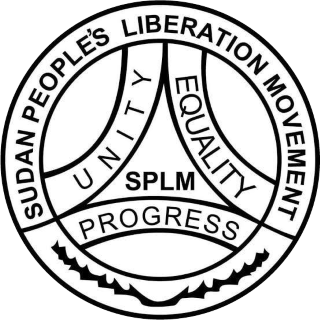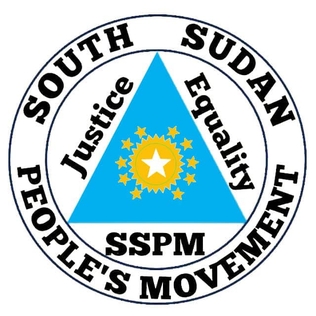
The Sudan People's Liberation Movement is a political party in South Sudan. It was initially founded as the political wing of the Sudan People's Liberation Army in 1983. On January 9, 2005 the SPLA, the SPLM and the Government of Sudan signed the Comprehensive Peace Agreement, ending the civil war. SPLM then obtained representation in the Government of Sudan, and was the main constituent of the Government of the then semi-autonomous Southern Sudan. When South Sudan became a sovereign state on 9 July 2011, SPLM became the ruling party of the new republic. SPLM branches in Sudan separated themselves from SPLM, forming the Sudan People's Liberation Movement–North. Further factionalism appeared as a result of the 2013–2014 South Sudanese Civil War, with President Salva Kiir leading the SPLM-Juba and former Vice President Riek Machar leading the Sudan People's Liberation Movement-in-Opposition.
Dr.Lam Akol Ajawin, is a South Sudanese politician of Shilluk descent. He is the current leader of National Democratic Movement (NDM) party. He is a former high-ranking official in the Sudan People's Liberation Army (SPLA), and subsequently became the Foreign Minister of Sudan from September 2005 to October 2007, when the Khartoum government offered the SPLA several other key ministries as part of a peace agreement.

Wau is a city in northwestern South Sudan, on the western bank of the Jur River, that serves as capital for Western Bahr el Ghazal. It lies approximately 650 kilometres (400 mi) northwest of the capital Juba. A culturally, ethnically and linguistically diverse urban center and trading hub, Wau is also the former headquarters of Western Bahr el Ghazal.

The South Sudan People's Defence Forces (SSPDF), formerly the Sudan People's Liberation Army (SPLA), is the army of the Republic of South Sudan. The SPLA was founded as a guerrilla movement against the government of Sudan in 1983 and was a key participant of the Second Sudanese Civil War, led by John Garang. After Garang's death in 2005, Salva Kiir was named the SPLA's new Commander-in-Chief. As of 2010, the SPLA was divided into divisions of 10,000–14,000 soldiers.
Mayom County is an administrative division of Unity State in the Greater Upper Nile region of South Sudan. It is located to the west of Bentiu. The county headquarters is Mayom town.
Ethnic violence in South Sudan has a long history among South Sudan's varied ethnic groups. South Sudan has 64 tribes with the largest being the Dinka, who constitute about 35% of the population and predominate in government. The second largest are the Nuers. Conflict is often aggravated among nomadic groups over the issue of cattle and grazing land and is part of the wider Sudanese nomadic conflicts.
Abiemnom County is an administrative area in the extreme northwest of Ruweng Administrative Area, South Sudan. It borders Southern Kordofan in Sudan to the north.
The South Sudan Democratic Movement (SSDM), sometimes called the South Sudan Democratic Movement/Army (SSDM/A), was a South Sudanese militant group. Along with its armed wing, the South Sudan Defence Army (SSDA), rebelled against the government of South Sudan led by President Salva Kiir Mayardit and the Sudan People's Liberation Movement.

The South Sudanese Civil War was a multi-sided civil war in South Sudan between forces of the government and opposition forces. In December 2013, President Salva Kiir accused his former deputy Riek Machar and 10 others of attempting a coup d'état. Machar denied trying to start a coup and fled to lead the Sudan People's Liberation Movement-in-Opposition (SPLM-IO). Fighting broke out between the Sudan People's Liberation Movement (SPLM) and SPLM-IO, igniting the civil war. Ugandan troops were deployed to fight alongside the South Sudanese government. The United Nations has peacekeepers in the country as part of the United Nations Mission in South Sudan (UNMISS).
Nyal Town is located in the Panyijar County of Unity State, in the Greater Upper Nile region of South Sudan. The town is known for the effects of extended fighting from the South Sudanese Civil War, leading to exceptionally poor humanitarian conditions including destruction of infrastructure, forced displacement, starvation, and sexual violence.

Armed clashes took in Wau State from late June 2016 to January 2019 between the Dinka-dominated Sudan People's Liberation Army (SPLA) and local opposition forces, consisting of tribal Fertit militias as well as fighters claiming allegiance to Riek Machar. It is unclear to what extent these rebels were actually part of the SPLM-IO or acting independently while using the SPLM-IO's name. The clashes resulted in the arrest of the state's governor, Elias Waya Nyipuoc, widespread death and destruction in the state capital, Wau town, and the displacement of up to 150,000 people.

In the early months of 2017, parts of South Sudan experienced a famine following several years of instability in the country's food supply caused by war and drought. The famine, largely focused in the northern part of the country, affected an estimated five million people. In May 2017, the famine was officially declared to have weakened to a state of severe food insecurity.
Yuai is the capital of Uror County, Jonglei State in the Greater Upper Nile region of South Sudan. It is the most populous place in Uror County. It has historically been associated with the Nuer White Army.
Mathiang Anyoor, also spelled Mathiang Anyur, also known as Dot Ke Beny, is a Dinka-affiliated militia group in South Sudan. Originally an ad-hoc volunteer force founded in 2012, the militia was transformed into a private army to protect President Salva Kiir Mayardit and army chief Paul Malong Awan. However, the South Sudanese military (SPLA) claims that it is just another battalion. Much of the ethnic violence against non-Dinkas in the South Sudanese Civil War is attributed to the militia.

The Pagak offensive was a major military operation by the South Sudanese government during the South Sudanese Civil War with the aim of capturing the strategic town of Pagak and the wider Maiwut County from Riek Machar's SPLM-IO rebels. Since the civil war's beginning, Pagak had served as headquarters and stronghold for the rebels, and its loss was believed to possibly greatly weaken the insurgency. A large part of the government forces that took part in the offensive are members of the SPLM-IO, a break-away group from Machar's movement that is loyal to First Vice President Taban Deng Gai. Though pro-government forces managed to capture Pagak on 6 August, their attempts to secure the surrounding areas proved unsuccessful. As result, the SPLA-held corridor between Mathiang and Pagak remained unsafe.
The Tiger Faction New Forces was a Shilluk militia that took part in the South Sudanese Civil War with the aim of reversing the division of South Sudan into 28 states in order to restore the territory of the Shilluk Kingdom per its 1956 borders. Led by Yoanis Okiech, the TFNF originally split from the Sudan People's Liberation Army (SPLA) in late October 2015 and subsequently started an insurgency against the SPLM government. In course of 2016, however, it also came into conflict with SPLM-IO rebels, leading to inter-rebel fighting which resulted in Okiech's death and the group's destruction in January 2017.
The 2014 retreat from Western Bahr el Ghazal, also called the long march north, was an unorganized withdrawal by hundreds of Nuer Sudan People's Liberation Army (SPLA) deserters who sought to flee from Bahr el Ghazal to Sudan during the South Sudanese Civil War. After longstanding tensions between SPLA soldiers belonging to the Dinka and Nuer ethnic groups escalated on 25 April 2014, leading to a massacre of Nuer soldiers at Mapel in Western Bahr el Ghazal, a large number of Nuer SPLA soldiers deserted to escape ethnic prosecution and loyalist SPLA forces. Though some deserters joined SPLM-IO rebels or surrendered to the government, a large number of them marched northward, joined by other SPLA defectors from Northern Bahr el Ghazal. After covering over 400 kilometres (250 mi), this trek eventually arrived in Sudan on 4 August 2014, where they were disarmed.
This article lists events from the year 2019 in South Sudan
The Battle of Bor was one of the first battles of the South Sudanese Civil War, consisting of a series of clashes for the city of Bor, the capital of Jonglei State, between the SPLA and SPLA defectors under Peter Gadet, part of the force that would become the SPLA-IO. The city changed hands four times between December 18, 2013 and January 18, 2014, ultimately leaving the SPLA in control.

South Sudan People's Movement/Army (SSPM/A) is a South Sudan opposition movement founded on 1st May 2021. In 2023, the group operated along the South Sudan-Sudan border in Upper Nile and Unity State.







